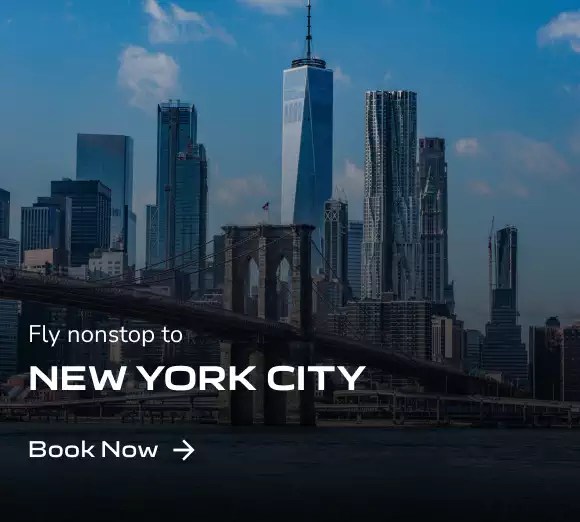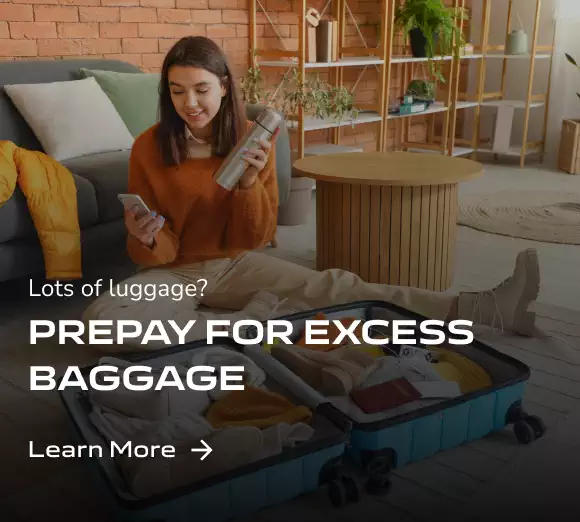Disability Assistance

Your comfort and well-being are our utmost responsibility. Our crew members are always there to help you throughout your journey. We remain devoted to ensuring that you have access to all our facilities and enjoy an incredible journey while flying with us. On this page, you will find all the information on the services we provide to travellers with special needs assistance or reduced mobility.
Important Information
Person with disability means any individual who has a physical or cognitive impairment that, on a permanent or temporary basis, substantially limits one or more major life activities, has a record of such impairment, or is regarded as having such impairment.
Note:
- Physical or cognitive impairment means:
- any physiological disorder or condition, cosmetic disfigurement, or anatomical loss affecting one or more of the following body systems: neurological, musculoskeletal, special sense organs, respiratory including speech organs, cardio-vascular, reproductive, digestive, genitourinary, hemic and lymphatic, skin, and endocrine; or
- any intellectual disability or psychological disorder, such as cognitive impairment, organic brain syndrome, emotional or intellectual illness, and specific learning disabilities.
- The term physical or intellectual impairment includes, but is not limited to, such diseases and conditions as orthopaedic, visual, speech, and hearing impairments, cerebral palsy, epilepsy, muscular dystrophy, multiple sclerosis, cancer, heart disease, diabetes, cognitive impairment, emotional illness, autism, drug addiction, alcoholism and geriatric disabilities.
- Major life activities mean functions such as caring for oneself, performing manual tasks, walking, seeing, hearing, speaking, breathing, learning and working.
- Has a record of such impairment means has a history of, or has been classified, or misclassified, as having a cognitive or physical impairment that substantially limits one or more major life activities.
Person with reduced mobility (PRM) means any person whose mobility when using transport is reduced due to any physical disability (sensory or loco-motor permanent or temporary), intellectual disability or impairment, or any other cause of disability, or age, and whose situation needs appropriate attention and the adaptation to his or her particular needs of the service made available to all passengers.
Documentation: Passengers should carry their notification card or Unique ID for persons with disabilities (UDID) or other medical documentation
Advance Notice: We request you to inform us about your special assistance needs well in advance. This will allow us to plan & ensure your travel experience is as smooth as possible.
Security Screening: Please rest assured that the security screening process shall try to take your needs into account. Please note that wheelchairs, stretchers and hand-carried items etc. shall also undergo screening as per the standard procedures.
Assistance at Security: If standing or waiting in line presents any difficulty for you, we request you to let the staff know. They will be happy to assist in best possible way.
For more information you may also reach out to our customer support.
Categories of special needs assistance
Passengers with special needs assistance are categorised into various groups, irrespective of their physical or medical condition. These groups are identified in airline messages by AIRIMP (ATA/IATA Reservations Interline Message Procedures) codes, such as
- WCHR Wheelchair: R for ramp (passenger can ascend/descend steps and walk to the seat)
- WCHS Wheelchair: S for steps (passenger is unable to ascend/descend steps but able to walk to the seat)
- WCHC: Wheelchair-C for cabin seat (passenger completely immobile)
- STCR: Stretcher passenger
- BLND: Blind passenger (specify if accompanied by guide dog)
- DEAF: Deaf passenger
- MEDA: Medical case (medical clearance required)
- OXYG: Needing oxygen during flight
- LEGL: Left leg-in cast
- LEGR: Right leg-in cast
- LEGB: Both legs in cast
Passengers with physical special needs assistance
Need help navigating the airport or the flight? We ensure your mobility is more accessible and comfortable at the airport and during the flight. Guests, their families, or a medical authority can make special requests while making a booking. Let us help you serve better.
Wheelchairs onboard
To ensure that we uphold the civil rights of passengers with a special needs assistance and offer a barrier-free environment, free usage of wheelchairs is made available to passengers travelling in any class.
- Please pre-book wheelchairs during flight booking or ticket issuance to avoid any last-minute delays or non-availability of wheelchairs. You can also request mobility assistance through the booking office while making a booking.
- We restrict the carriage of passengers in wheelchairs, considering air safety requirements on our flights. The objective of such restriction is primarily the safety of all in the unlikely event of an emergency evacuation.
- If you wish to carry your wheelchair and other assistive devices in the cabin, please note that it is subject to space availability.
- Wheelchairs or assistive devices will be loaded in the baggage hold, easily accessible for timely return.
- The passenger can access an airline or airport wheelchair once you check in the wheelchair.
- You can take your wheelchair to the aircraft door. The wheelchair must be duly tagged and sent for loading in the hold.
- Narrow wheelchair-type devices without armrests are available in the passenger cabin for assistance onboard.
Facilitation
To facilitate wheelchair assistance at the airport, we ensure that:
- Wheelchair requests are adequately recorded and confirmed in the Special Service Request (SSR) element for each flight and interline journey segment.
- Only appropriate inputs are added to the system while booking so that the cabin crew can derive information and take action.
- Disabled passengers are boarded first and deplaned last for the ease of movement of all passengers. They are seated near the washroom and aisle.
- The commander and cabin crew are briefed on the passenger's medical history to enable them to assist onboard.
- After departure, messages are sent to all en-route destinations to help during transit and arrival.
- On arrival, our team will help you in deplaning, and an escort will take you to the baggage hall or connecting carrier if there is an onward connection.
Personal electric wheelchair / mobility aid
- If you are travelling with an electric wheelchair / mobility aid, we request you to review the required documents, conditions of carriage, and guidelines specific to your wheelchair’s battery type.
- In case you need to take your electric wheelchair to the gate, our staff will try to accommodate this, depending on airport security procedures and the availability of equipment such as ramps or lifts. After boarding, your wheelchair will be loaded into the aircraft hold. Upon arrival, we will try to return your wheelchair at the gate. If that is not possible due to operational constraints, a wheelchair will be provided to assist you till the baggage claim area.
Medical clearance is not required
- Passengers with impairment who only need special assistance at the airport or during embarking or disembarking do not require medical clearance or particular forms.
- The medical department of any carrier may issue a FREMEC (Frequent Travelers' Medical Card) for passengers who need assistance to travel. A valid FREMEC card is then accepted as medical clearance.
Medical clearance required
The following passengers will be subject to clearance from Air India's medical and related services department or advisors of all other interline carriers involved in the journey:
- For any contagious and infectious diseases.
- Any condition that may harm the welfare and comfort of other passengers.
- If the situation poses a potential hazard to the safety of the flight, that includes the possibility of a diversion and unscheduled landing.
- If medical attention and special equipment are required to maintain the passenger's health during the flight.
- If passengers have a medical condition that could be aggravated during the flight.
Documents to carry
- The passenger must fill in all the information on medical assistance on the information sheet. They can fill this sheet when booking at the agent's or airline's office.
- MEDIF form completed by the attending doctor must be forwarded to Air India's medical services department for clearance. After receiving consent to travel from the medical department and the other participating carriers, the booking will be facilitated, along with the completion of the PNR.
- Passengers requiring a continuous oxygen supply can only book it on short-haul, nonstop flights.
Passengers with intellectual or developmental disability
Passengers with intellectual disabilities (PwID) or developmental disabilities will be accepted onboard only when:
- Travelling with a suitable/trained attendant.
- The trained attendant must carry the treating physician's certificate and a prescription for an injectable sedative medicine, which may be required to be administered by the attendant before the start of travel or needed en-route.
- The attendant must be briefed that no cabin crew will be specially assigned to look after the passenger concerned.
- Passengers are recommended to pre-book their seats on Air India’s website/app.
Passengers with visual impairment with guide dogs
A trained guide dog to lead the visually impaired will be permitted onboard only if the required entry permits into the destination and countries of transit are obtained.
- All permits are required to be presented at the time of reservation.
- The guide dog must be properly harnessed and muzzled.
- The guide dog can be carried in the passenger cabin or the hold, depending upon the individual country's regulations as well as the size of the dog.
- The guide dog will not be permitted to occupy a seat.
- The guide dog taken is free of charge in addition to the standard free baggage allowance.
- The carriage of the guide dog will not be allowed if any country or territory enroute prohibits its entry.
Refusal of carriage
Air India may refuse to carry passengers under the following conditions:
- A passenger's physical or medical condition threatens the safety of other passengers and the property, aircraft, or crew.
- A passenger refuses to comply with Air India's travel conditions.
- Passengers with hearing or visual impairment, limited mobility and requiring a stretcher are not accompanied by an escort.
- The passenger has an infection or condition that causes discomfort to other passengers.
MEDIF forms
The MEDIF form is an IATA-approved document that lists the minimum information to be provided to the airline to carry disabled passengers. The airline is free to ask for additional information or clarifications if required.
- The medical forms must be filled in for clearance and may be obtained from any Air India office.
- The MEDIF form is to be filled out by the passenger or an authorised representative in case of any difficulty in completing the formality.
- An essential aspect of MEDIF (information on clinical condition) must be completed by the physician in charge of passengers with impairments.
- To complete the form, it is mandatory to include the treating physician's certification and the passenger's undertaking/declaration at the end of the MEDIF.
- The passenger or their representative must sign the MEDIF form requesting air travel.
- MEDIF forms must be filled in every time a disabled passenger travels by commercial airlines, and the clearance is valid only for a particular flight and date.
Where interline travel on other airlines is involved, advance arrangement with the other carrier is necessary to confirm special meals, medicines, oxygen, ambulance, and other requirements.
Rules for non-discrimination based on disability in the US
This rule covers Air India for any flight that begins or ends at a US Airport. An accessible copy of the law can also be obtained from the US Department of Transport using the following methods:
- For calls from within the United States, the toll-free hotline by telephone number for air travellers with disabilities is 1-800-778-4838 (voice) or 1-800-455-9880 (TTY).
- The Aviation Consumer Protection division telephone number is 202-366-2220 (voice) or 202-366-0511 (TTY).
- Mail to the Air Consumer Protection Division, C-75, US Department of Transportation, 1200 New Jersey Ave., SE., West Building, Room W96-432, Washington, DC 20590
- The Aviation Consumer Protection Division's website https://www.dot.gov/airconsumer
Learn more about special needs assistance access facilitation in the UK and Australia.










